Media Hub / January 27, 2022
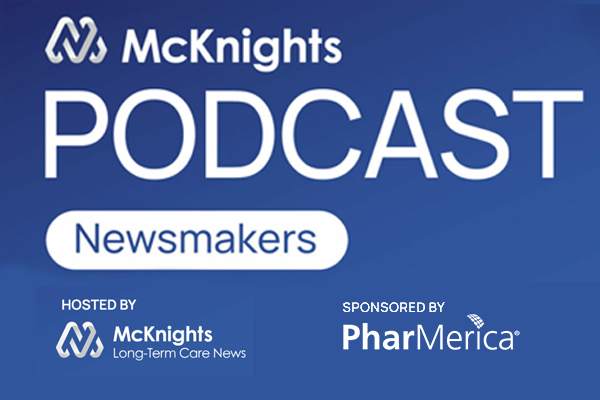
PharMerica has partnered with McKnight’s Long-Term Care News for a monthly podcast series.
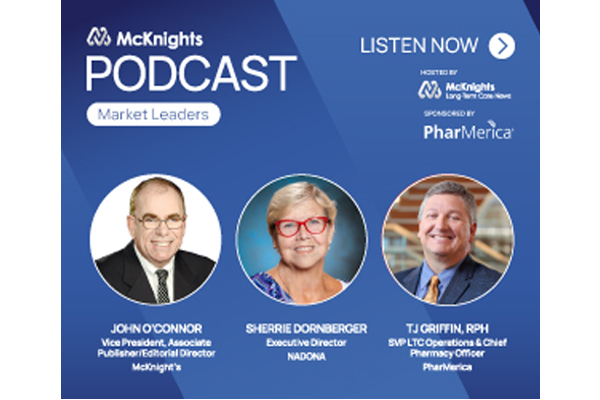 When admissions from hospitals and the community plummeted during COVID, nursing home occupancy crashed. Despite some gains in 2021, occupancy stood at 75% in September. A return to pre-pandemic rates is still far off, but the virus is no longer the only culprit. Projected financial losses are leading to staff cuts in settings already plagued by vaccine mandates and retention challenges. And fewer workers mean fewer beds. That’s because the loss of direct care workers reduces the number of residents a facility can safely admit without having quality levels suffer. In fact, nearly 60% of nursing homes are limiting new admissions due to shortages.
When admissions from hospitals and the community plummeted during COVID, nursing home occupancy crashed. Despite some gains in 2021, occupancy stood at 75% in September. A return to pre-pandemic rates is still far off, but the virus is no longer the only culprit. Projected financial losses are leading to staff cuts in settings already plagued by vaccine mandates and retention challenges. And fewer workers mean fewer beds. That’s because the loss of direct care workers reduces the number of residents a facility can safely admit without having quality levels suffer. In fact, nearly 60% of nursing homes are limiting new admissions due to shortages.
Speakers:
TJ Griffin, SVP/LTC Operations & Chief Pharmacy Officer, PharMerica
John O’Conner, Vice President, Associate Publisher/Editorial Director, McKnight’s
Guest Spotlight:
Sherrie Dornberger, Executive Director, NADONA
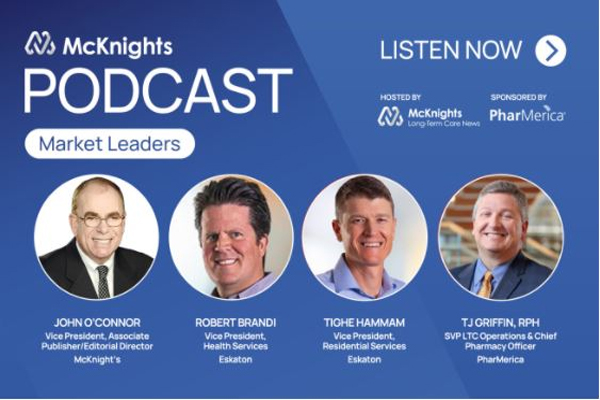 The workforce crisis in long-term care is not a new phenomenon, but one that has been decades in the making. Regulations make it difficult for facilities to stay efficient without investing in resources to manage the overload of daily administrative work.
The workforce crisis in long-term care is not a new phenomenon, but one that has been decades in the making. Regulations make it difficult for facilities to stay efficient without investing in resources to manage the overload of daily administrative work.
Long-term staffing plans are certainly worth considering, but ultimately freeing up staff from administrative tasks and introducing operational efficiencies that allow them to spend more time with patients is in everyone’s best interest — the facility’s, the staff’s and the patients’.
Many administrative tasks in long-term care are repetitive and tedious, which leave care teams overworked and with less time to spend on patients. With minimal investment, however, hundreds of hours can be saved while delivering better patient outcomes, lower operational costs and faster revenue recognition.
In this episode, we’ll examine trends, challenges and opportunities facing long-term care leaders in skilled nursing. You will walk away with proven methods to enhance operational efficiencies while improving outcomes.
 The transitional care management model has been growing in popularity in long-term care as more residents seek to stay healthy at home with the person-centered support they need and several new programs allow Medicaid-funded services at home or in the community. As residents discharge from nursing homes, this approach affords facilities the opportunity to play an active role in transitional care management for those leaving and realize:
The transitional care management model has been growing in popularity in long-term care as more residents seek to stay healthy at home with the person-centered support they need and several new programs allow Medicaid-funded services at home or in the community. As residents discharge from nursing homes, this approach affords facilities the opportunity to play an active role in transitional care management for those leaving and realize:
In this episode, we’ll explore the influencers that support this transitional care model and how facilities can take steps to capitalize on the growth of care at home to impact their census, financial penalties, and outcomes.
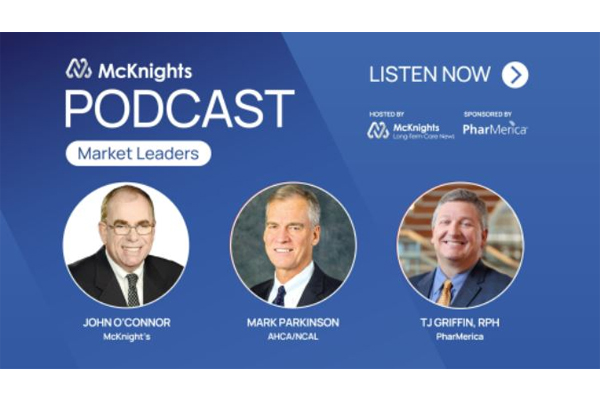 Mark Parkinson, President and CEO of The American Health Care Association and National Center for Assisted Living (AHCA/NCAL) AHCA/NCAL, recently sent a letter to Congressional Leadership requesting additional resources for long-term care residents and staff. In it, he outlined the current state of the industry:
Mark Parkinson, President and CEO of The American Health Care Association and National Center for Assisted Living (AHCA/NCAL) AHCA/NCAL, recently sent a letter to Congressional Leadership requesting additional resources for long-term care residents and staff. In it, he outlined the current state of the industry:
In this episode, we’ll hear from Mark Parkinson firsthand on his specific request to have Congress take additional steps to ensure the safety and protection of America’s most vulnerable. You will walk away with a better understanding of how these measures would help invest in the frontline caregivers our nation’s seniors need, so they continue to have access to high quality, long-term care. Read the full letter.
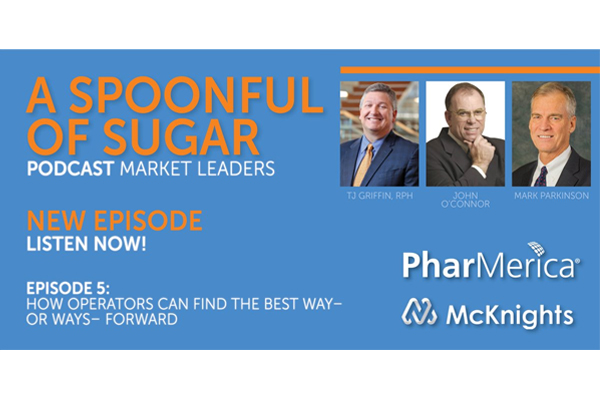 An unprecedented pandemic has challenged providers in almost every conceivable way. Operational costs rose, occupancy levels dropped and staffing shortages became the new normal. Faced with these and other challenges, providers have responded by becoming resourceful and innovative as never before. But the sector’s work is far from complete.
An unprecedented pandemic has challenged providers in almost every conceivable way. Operational costs rose, occupancy levels dropped and staffing shortages became the new normal. Faced with these and other challenges, providers have responded by becoming resourceful and innovative as never before. But the sector’s work is far from complete.
Mark Parkinson, President and CEO of The American Health Care Association and National Center for Assisted Living (AHCA/NCAL) AHCA/NCAL, will discuss new strategies that can help long-term and post-acute care professionals drive the industry forward as well as the sentiments behind them:
The strategies include:
1. The need to explore vendor partners and local presence
2. Implementing a transitional care management program
3. Deepening relationships with ACOs
4. Investing in specialty care services (Dialysis, ventilators, etc.)
5. Launching an ancillary business (Home health, pharmacy, etc.)
6. Institutional Special Needs Plan (I-SNP)
In this episode, we’ll hear from Mark Parkinson firsthand on growth opportunities and strategies your organization can embrace. These insights will help providers not just survive, but thrive in the years ahead.
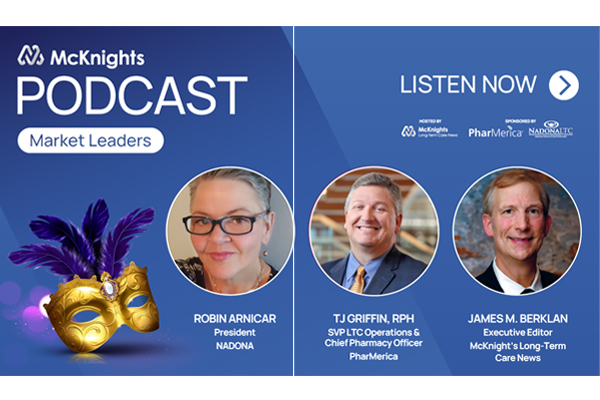
From staffing and regulatory issues to the many challenges DONs face in long-term care, NADONA, McKnight’s and PharMerica surveyed nurses to find out their biggest concerns in 2022. We’ll address them all during our live podcast event.
In this podcast, we will discuss the topics nurses told us are their top challenges, including important trends that are, or will be, affecting you, your facilities, and your residents. We know keeping educated about and on top of these issues is a constant challenge for DONs and Nurse Leaders. That’s why we’re here for you with solutions to the top concerns you face daily. You have a voice with us!
MDS coordinators are usually responsible for two core duties: monitoring care quality and maximizing payments.
But as staffing  challenges worsen and regulations increase, more MDS coordinators are taking on a third responsibility: walking the floor. Is this a reasonable job extension? Or an unfair demand? Moreover, might facilities that adopt this practice be leaving money on the table? In this Spoonful of Sugar podcast, two of the nation’s foremost nursing experts will address the pros and cons of this emerging trend.
challenges worsen and regulations increase, more MDS coordinators are taking on a third responsibility: walking the floor. Is this a reasonable job extension? Or an unfair demand? Moreover, might facilities that adopt this practice be leaving money on the table? In this Spoonful of Sugar podcast, two of the nation’s foremost nursing experts will address the pros and cons of this emerging trend.
 For the past two years, operators have had to deal with higher costs brought on by COVID-19. Now comes the highest inflation rates seen in more than four decades.
For the past two years, operators have had to deal with higher costs brought on by COVID-19. Now comes the highest inflation rates seen in more than four decades.
In episode 1 of this two-part Spoonful of Sugar podcast, you will hear from industry legend Robert G. Kramer as he talks through the impact of higher operating costs in this sector.
He’ll dig into the diverse new pressures operators are coping with, and will discuss why the new normal promises to be very different indeed.
Industry legend Robert G. Kramer returns to the mic in our latest podcast. In this second episode in our 2-part series, he discusses the rise of innovative housing and care options for seniors, from intergenerational living to personalized, customized experiences.
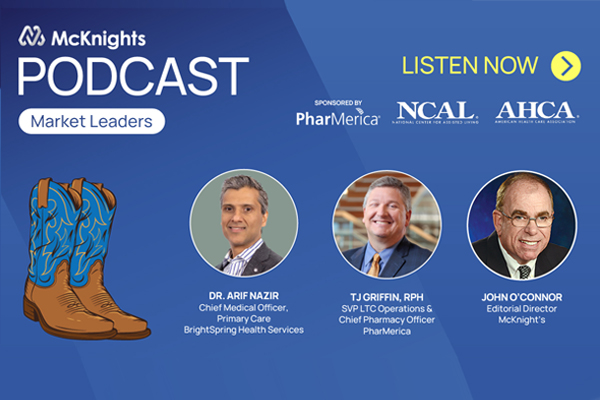 Amidst the excitement and energy of the American Health Care Association’s (AHCA) 2022 Convention & Expo, innovation was in the air – but nowhere more than at the live Spoonful of Sugar podcast.
Amidst the excitement and energy of the American Health Care Association’s (AHCA) 2022 Convention & Expo, innovation was in the air – but nowhere more than at the live Spoonful of Sugar podcast.
McKnight’s Editorial Director John O’Connor hosts Arif Nazir, MD, Chief Medical Officer of BrightSpring, and PharMerica’s TJ Griffin, PPH, to discuss how Continue Care’s transitional care model integrates seamlessly into a facility’s discharge planning process to extend care management into the home. This program offers a dynamic set of services that promote medication therapy optimization and nurse-practitioner led care to partner with facility staff.
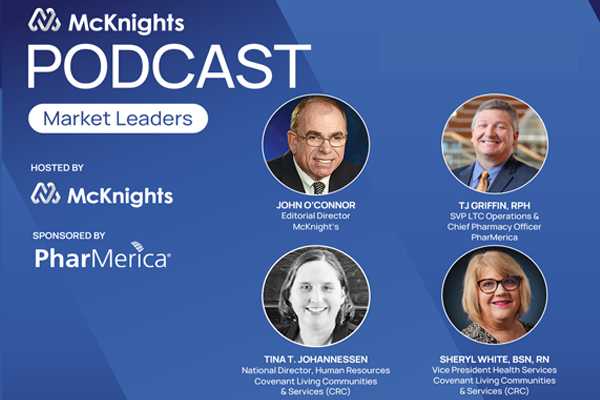 Staffing shortages and high turnover rates are constant challenges across the LTC sector. Unfortunately, COVID-19 has only made things worse. Nursing facilities have lost nearly a quarter million employees during the current pandemic.
Staffing shortages and high turnover rates are constant challenges across the LTC sector. Unfortunately, COVID-19 has only made things worse. Nursing facilities have lost nearly a quarter million employees during the current pandemic.
Given the direct correlation between staffing levels and adverse outcomes — including increased mortality, hospitalizations, and ED visits — how can facilities improve the safety and quality of care when workers can’t be had?
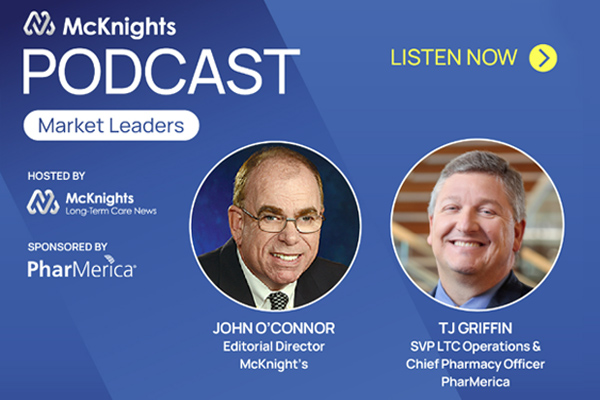 CMS plans to increase psychotropic drugs oversight – to include targeted audits. These stepped up efforts follow the latest updates to the State Operations Manual surveyors started using October 24, 2022, which include unnecessary psychotropic use, misdiagnosis related to antipsychotics, and gradual dose reductions of these medications. Nursing facilities are not yet required to have a psychotropic stewardship program. But adopting one can preempt regulatory action while promoting the appropriate use of these medications to improve outcomes, reduce adverse events, and drive a higher Five-Star rating.
CMS plans to increase psychotropic drugs oversight – to include targeted audits. These stepped up efforts follow the latest updates to the State Operations Manual surveyors started using October 24, 2022, which include unnecessary psychotropic use, misdiagnosis related to antipsychotics, and gradual dose reductions of these medications. Nursing facilities are not yet required to have a psychotropic stewardship program. But adopting one can preempt regulatory action while promoting the appropriate use of these medications to improve outcomes, reduce adverse events, and drive a higher Five-Star rating.
Podcast hosts hosts John O’Connor, Vice President, Associate Publisher / Editorial Director, McKnight’s, and TJ Griffin, RPh, SVP LTC Operations & Chief Pharmacy Officer, PharMerica, discuss the importance of implementing a psychotropic stewardship program to prevent headaches, problems, and control costs down the line – and get a leg up if CMS decides to mandate such an initiative.
 At Viviant Healthcare of Murfreesboro, located in rural TN, 25% of residents are short stay. When they leave, Lisa Lugo, Director of Social Services, worries. Lacking transportation makes it hard for many to fill prescriptions. Some in need of pain medications can’t get an appointment with a pain clinic for days. Others return home and don’t follow up with their healthcare providers.
At Viviant Healthcare of Murfreesboro, located in rural TN, 25% of residents are short stay. When they leave, Lisa Lugo, Director of Social Services, worries. Lacking transportation makes it hard for many to fill prescriptions. Some in need of pain medications can’t get an appointment with a pain clinic for days. Others return home and don’t follow up with their healthcare providers.
Without support, residents may experience health mishaps that land them back in the hospital. To avoid these complications, Lugo opted to take part in a pilot program for Continue Care, a suite of services from PharMerica designed to help keep patients healthy at home. It worked: the rehospitalization rate for Viviant during the pilot was 10%, a significant improvement over the average rate among SNFs of 23%-31%.
And residents weren’t the only ones who benefitted. By eliminating manual processes and calls or faxes to the pharmacy to get prescriptions filled, Continue Care saves a lot of staff time and frustration and frees caregivers up to spend more time with residents. Plus, with a three on/three off schedule, there’s no risk of orders falling through the cracks between shifts.
Hear firsthand from Lugo when she joins hosts John O’Connor and TJ Griffin along with PharMerica’s Bill Deane, whose team operationalized the program, to discuss her facility’s previous processes that prompted her to adopt Continue Care and the positive impacts it has had on outcomes and her team alike.
Filed under: Media Hub, Pharmacy Solutions